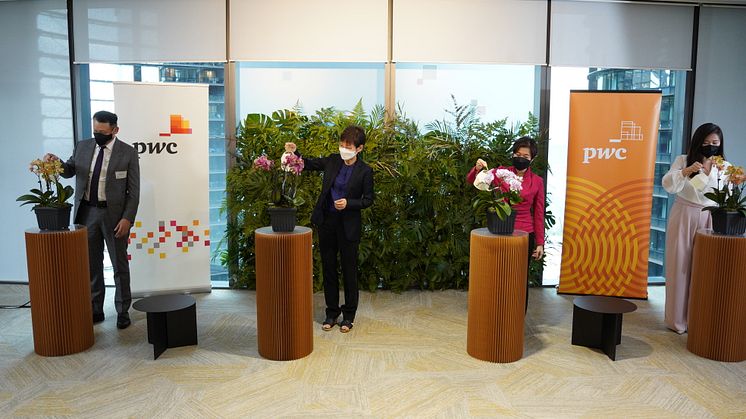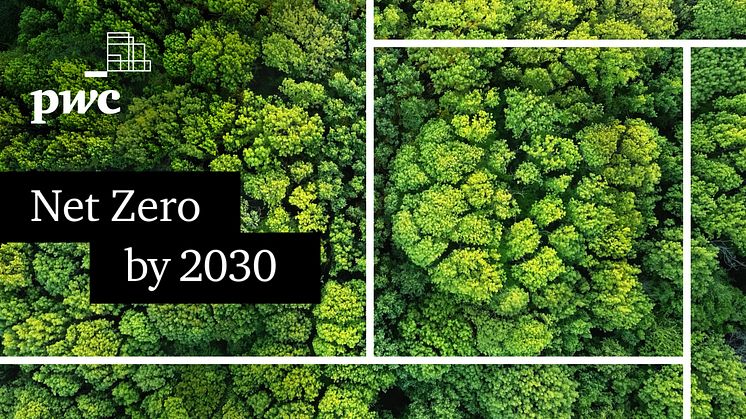
Press release -
PwC’s climate targets validated by SBTi
- SBTi Validation Affirms PwC’s approach and timeline to achieve net zero 2030 commitment
- Commitment includes a 50% absolute reduction in business travel emissions
Singapore, September 8, 2021 — Today, PwC announced it received validation for its science-based targets and reaffirmed its commitment to achieve net zero greenhouse gas (GHG) emissions by 2030.
The Science Based Targets initiative (SBTi) validated PwC’s targets . Importantly, PwC’s targets go beyond scopes 1 & 2 emissions to include PwC’s largest indirect scope 3 emissions.
Bob Moritz, Global Chairman of PwC, says:
“Climate change is one of the most urgent problems facing our planet today. As part of our new strategy - The New Equation - we are renewing our commitment to be part of the solution. That is why we have committed to be net zero by 2030, and I am pleased the SBTi have validated our emissions reduction targets. Like our clients, we need to build trust with our stakeholders and deliver sustained outcomes - and tackling our climate impact is crucial to both.”
With this approach, which aligns to SBTi’s highest ambition level, PwC commits to decarbonising the way it operates and decoupling its business growth from emissions.
Colm Kelly, Global Leader for Purpose, Policy and Corporate Responsibility for the PwC Network says:
“As we support our clients and suppliers in transforming their businesses to achieve net zero, we recognise the importance of actively reducing the climate impact of our own operational footprint – including scope 3 emissions. As such, PwC has committed to meet SBTi’s highest level of ambition and our scope 3 emissions reduction target aligns to the 1.5 degree scenario.”
Marcus Lam, Executive Chairman, PwC Singapore adds:
“Here in Singapore, beyond our net zero commitment, we’re committed to being a key enabler of Singapore's sustainability and decarbonisation efforts. From upskilling our people, engaging the business community through a low carbon network that facilitates knowledge and resource sharing, to the setting up of an Asia Pacific ESG centre of excellence, now is the time to deliver bold ideas and solutions which are human-led and tech-powered to help our clients and society achieve sustained outcomes.”
As outlined in PwC’s new global strategy, The New Equation, PwC has committed to transforming its business model to decarbonise its value chain, increasing transparency, and supporting the development of robust ESG reporting frameworks and standards. The PwC network will also engage its clients and suppliers to support them to tackle their climate impact.
PwC’s commitment involves four key areas:
- Operations: PwC will reduce its emissions in line with a 1.5 degree climate scenario, including a 50% reduction in scope 1 and 2 emissions and a 50% absolute reduction in business travel emissions from a 2019 base by 2030. In addition, PwC will accelerate its transition to 100% renewable electricity and to mitigate its impacts today, PwC will continue to offset its emissions through high-quality carbon credits.
- Clients: PwC will work with its clients to support their efforts to make a net zero future a reality for all. Building on existing client work in sustainability and net zero transformation.
- Suppliers: PwC will engage with key suppliers, encouraging and supporting them to achieve net zero. We commit that 50% of our global purchased goods and services suppliers by emissions will have set their own science-based targets to reduce their climate impact by 2025.
- Climate agenda: PwC will continue its long-standing programme of research and collaboration with business, policy makers, and NGOs to accelerate a net zero economy.
Using 2019 levels as a base year, PwC will regularly and transparently report on the progress of its operations’ targets, enhancing its GHG emissions reporting beginning in 2023, utilising expanded reporting based on the World Economic Forum/International Business Council (IBC) metrics, as well as the recommendations of the World Business Council on Sustainable Development.
Learn more about PwC’s net zero commitment here.
Topics
Categories
About PwC
At PwC, our purpose is to build trust in society and solve important problems. We’re a network of firms in 155 countries with over 284,000 people who are committed to delivering quality in assurance, advisory and tax services. Find out more and tell us what matters to you by visiting us at www.pwc.com/sg.
PwC refers to the PwC network and/or one or more of its member firms, each of which is a separate legal entity. Please see www.pwc.com/structure for further details.
© 2020 PwC. All rights reserved









